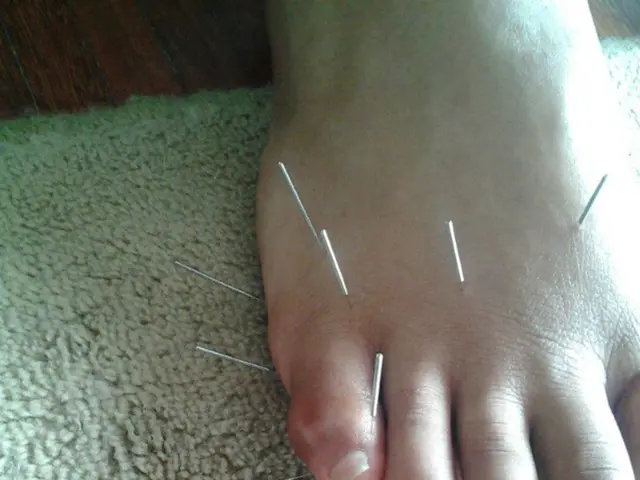Discovered Connection Between Vitamin D and Birth Control Contraceptives
Spreading the Word on Vitamin D and Birth Control
Here's a fun, straightforward breakdown of a recent discovery: women taking estrogen-based birth control pills might have higher levels of vitamin D in their system. On the flip side, those who stop using these contraceptives may experience a significant drop in vitamin D levels.
Vitamin D: The Bone-Boosting Hero
This essential nutrient plays a crucial role in keeping your bones strong by maintaining proper levels of calcium and phosphorus in your blood. It also helps your body absorb calcium, a key component of bones. While foods like fish, eggs, and sunlight exposure can provide vitamin D, a whopping 90% comes from sun exposure.
The Vitamin D Bone Zone
Vitamin D deficiency can lead to problems like rickets and osteomalacia (softening of the bones), making it super important, especially during pregnancy. So, what about those estrogen-based birth control pills messing with our vitamin D game?
Researchers at the National Institutes of Health decided to dig into this, examining data from the Study of Environment, Lifestyle, and Fibroids, which looked at the reproductive health of nearly 1,700 African-American women in Detroit. By questioning women about their contraceptive use and their sun exposure, the team was able to collect blood samples and measure the women's vitamin D levels.
Contraception & Vitamin D: A New Connection
As it turns out, women using contraceptives containing estrogen had higher vitamin D levels compared to others in the study. Even after considering factors like seasonal light exposure, the difference remained significant. However, the researchers couldn't find any behavioral explanations for this increased vitamin D absorption, like longer sun exposure.
After making the necessary adjustments for confounding variables, they found that estrogen-based contraceptive pill, patch, or ring users had 20% higher levels of vitamin D. Interestingly, current users had higher vitamin D levels, while past users had average levels.
Vitamin D and Early Pregnancy
These findings, published in the Journal of Clinical Endocrinology & Metabolism, suggest that women planning to conceive and pregnant women may be at risk of developing vitamin D deficiency when they stop using birth control.
The researchers are following the women in this study to learn more about the relationship between contraceptives and vitamin D. They're also working on a new group of participants to investigate how vitamin D levels vary across the menstrual cycle.
So there you have it! If you're thinking about ditching the estrogen-based birth control, keep an eye on your vitamin D levels. It's essential for maintaining strong bones and overall health, especially during pregnancy.
A Few More Thoughts on Our Friendly Vitamin D
While this relationship between estrogen-based birth control and vitamin D levels isn't extensively covered in existing research, here's what we think might be going on:
Hormonal influences: Estrogen-based birth control might affect vitamin D metabolism or absorption, but the specifics aren't entirely clear.
Bone health: Since estrogen-based birth control can impact bone health, and vitamin D is crucial for bone density, there might be indirect benefits to bone health when vitamin D levels are adequate.
Racial considerations: Given that darker skin tones tend to have lower vitamin D levels, any effect of estrogen-based birth control on vitamin D might be more noticeable in these populations, possibly leading to increased risk of deficiency.
In summary, while the connection between estrogen-based birth control and vitamin D levels is still being investigated, both factors play essential roles in women's health, especially bone health. Further research is needed to clarify these interactions.
- The study of Environment, Lifestyle, and Fibroids, which focused on the reproductive health of African-American women, found that women using contraceptives containing estrogen had higher levels of vitamin D compared to others.
- Researchers discovered that estrogen-based contraceptive pill, patch, or ring users had 20% higher levels of vitamin D, pointing towards a potential link between these two factors.
- Women planning to conceive or those who are pregnant may be at risk of developing vitamin D deficiency when they stop using estrogen-based birth control, as suggested by the findings published in the Journal of Clinical Endocrinology & Metabolism.
- While the specific ways in which estrogen-based birth control might affect vitamin D metabolism or absorption are not entirely clear, it's important to monitor vitamin D levels when considering the discontinuation of such contraceptives.
- The relation between estrogen-based birth control and vitamin D levels might be more noticeable in populations with darker skin tones, who tend to have lower vitamin D levels, potentially leading to increased risks of deficiency.
- Further research is needed to clarify the interactions between estrogen-based birth control and vitamin D, as these two factors play essential roles in women's health, particularly bone health.







